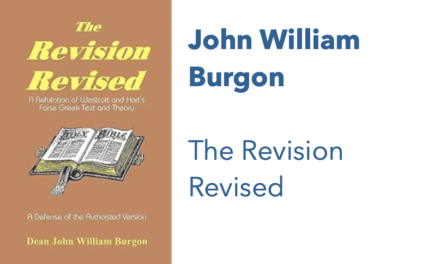
Dust in the Eyes
Recognizing the Diversion Fallacy in Text-critical Apologetics
By Christian McShaffrey
Advocates of the modern critical text have been using the “diversion fallacy” to defend their view for over a century (i.e., diverting attention from the real issue to an issue having only a surface relevance to the first).
For example, when John William Burgon argued against “The New Greek Text” produced by the Revision Committee in the late nineteenth century, he did so properly and thoroughly by demonstrating the inconsistencies that exist between the codices that had so recently established “a tyrannical ascendency over the imagination of the Critics, which can only be fitly spoken of as a blind superstition.”
For those who are interested in the specific data cited, Burgon tabulated the differences between the five major codices on pages 12-17 of his book The Revision Revised [read online or buy a copy].
Before proceeding to compare the readings in the codices to those found in the ancient versions (i.e., translations) and the writings of the Church Fathers, Burgon pauses to warn his readers of the aforementioned diversion fallacy:
Let no one… obscure the one question at issue, by asking, “Whether we consider the Textus Receptus infallible?” The merit or demerit of the Received Text has absolutely nothing whatever to do with the question. We care nothing about it.
Any Text would equally suit our present purpose. Any Text would show the “old uncials” perpetually at discord among themselves.
To raise an irrelevant discussion, at the outset, concerning the Textus Receptus — to describe the haste with which Erasmus produced the first published edition of the N.T. — to make sport about the copies which he employed — all this kind of thing is the proceeding of one who seeks to mislead his readers — to throw dust into their eyes — (The Revision Revised, 17-18).
Next time someone throws dust into your eyes as you try to raise questions and concerns over the demonstrably depraved text-base of Westcott and Hort, just call it out for the intellectual foul it truly is.




